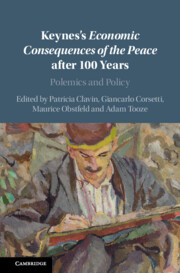Book contents
- Keynes’s Economic Consequences of the Peace after 100 Years
- Keynes’s Economic Consequences of the Peace after 100 Years
- Copyright page
- Contents
- Plates
- Figures
- Tables
- Contributors
- Preface
- Acknowledgements
- 1 Lessons of Keynes’s Economic Consequences in a Turbulent Century
- 2 The Making of a Classic: Keynes and the Origins of The Economic Consequences of the Peace
- 3 Keynes’s Economic Consequences (1919)
- 4 “Too Bad to Be True”: Swedish Economists on Keynes’s The Economic Consequences of the Peace and German Reparations, 1919–29
- 5 Revisionism as Intellectual-Political Vindication, or the French Receptions of Consequences after the Two World Wars (1919–1946)
- 6 Between Cambridge, Paris, and Amsterdam
- 7 Keynes, the Transfer Problem, and Reparations
- 8 The Speculative Consequences of the Peace
- 9 Why Was Keynes Opposed to Reparations and a Carthaginian Peace?
- 10 One Case Where The Economic Consequences of the Peace Mattered
- 11 Keynes and International Trade Politics after the First World War
- 12 Gold, International Monetary Cooperation, and the Tripartite Agreement of 1936
- 13 Exchange Rates, Tariffs and Prices in 1930s Britain
- 14 “Unusual, Unstable, Complicated, Unreliable and Temporary”: Reinterpreting the Ebb and Flow of Globalization
- 15 Keynes’s Arc of Discovery
- 16 Keynes, The Economic Consequences of the Peace, and Popular Perceptions of the First World War
- Index
- Plate Section (PDF Only)
- References
3 - Keynes’s Economic Consequences (1919)
The Book and Its Critics
Published online by Cambridge University Press: 14 December 2023
- Keynes’s Economic Consequences of the Peace after 100 Years
- Keynes’s Economic Consequences of the Peace after 100 Years
- Copyright page
- Contents
- Plates
- Figures
- Tables
- Contributors
- Preface
- Acknowledgements
- 1 Lessons of Keynes’s Economic Consequences in a Turbulent Century
- 2 The Making of a Classic: Keynes and the Origins of The Economic Consequences of the Peace
- 3 Keynes’s Economic Consequences (1919)
- 4 “Too Bad to Be True”: Swedish Economists on Keynes’s The Economic Consequences of the Peace and German Reparations, 1919–29
- 5 Revisionism as Intellectual-Political Vindication, or the French Receptions of Consequences after the Two World Wars (1919–1946)
- 6 Between Cambridge, Paris, and Amsterdam
- 7 Keynes, the Transfer Problem, and Reparations
- 8 The Speculative Consequences of the Peace
- 9 Why Was Keynes Opposed to Reparations and a Carthaginian Peace?
- 10 One Case Where The Economic Consequences of the Peace Mattered
- 11 Keynes and International Trade Politics after the First World War
- 12 Gold, International Monetary Cooperation, and the Tripartite Agreement of 1936
- 13 Exchange Rates, Tariffs and Prices in 1930s Britain
- 14 “Unusual, Unstable, Complicated, Unreliable and Temporary”: Reinterpreting the Ebb and Flow of Globalization
- 15 Keynes’s Arc of Discovery
- 16 Keynes, The Economic Consequences of the Peace, and Popular Perceptions of the First World War
- Index
- Plate Section (PDF Only)
- References
Summary
The continued relevance of Keynes’s famous polemic, after more than a century, is itself remarkable. It has always been controversial: first as polemic, then as economic analysis, and finally as historiography. In which genre should we place it? The literary force of its vignettes of the key participants must be acknowledged. Likewise the concentration on reparations in linking the Armistice to a burden of post-war debt highlights the notion of guilt. And the distinction between historic ‘indemnities’ and the wholly new coinage of ‘reparations’ still needs to be better understood. Hence the inescapable centrality of Article 231 of the Treaty, the famous War Guilt Clause. Subsequent controversy has focused largely on assessments of the actual burden that reparations posed – or would have done if actually paid. Here the salience of Etienne Mantoux’s contribution in 1945 is still worthy of acknowledgment (though, ironically, not in castigating Keynes as ‘anti-French’). Instead, the ongoing significance of the analysis presented in the Economic Consequences points to the centrality of Keynes’s vision of the welfare of Europe as an integrated organic whole – rather than seeing the Treaty as a zero-sum game in which Germany had to punished, for moral as much as economic reasons.
- Type
- Chapter
- Information
- Keynes's Economic Consequences of the Peace after 100 YearsPolemics and Policy, pp. 82 - 98Publisher: Cambridge University PressPrint publication year: 2024

